|
|
|
Sort Order |
|
|
|
Items / Page
|
|
|
|
|
|
|
| Srl | Item |
| 1 |
ID:
102056
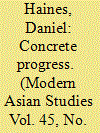

|
|
|
|
|
| Publication |
2011.
|
| Summary/Abstract |
The idea of 'developing' Sind has been a lynchpin of government action and rhetoric in the province during the twentieth century. The central symbols of this 'development' were three barrage dams, completed between 1932 and 1962. Because of the barrages' huge economic and ideological significance, the ceremonies connected with the construction and opening of these barrages provide a unique opportunity to examine the public presentation of state authority by the colonial and postcolonial governments. This paper investigates the way that ideas of 'development' and 'modernity' appeared in discourses connected with these ceremonies, in order to demonstrate that the idea of imposing 'progress' on a province considered 'backward' by the state administrators survived longer than the British regime which had introduced it. The paper begins with the historical links between water-provision and governance in Sind, before examining the way that immediate political concerns of the sitting governments were addressed in connection with the projects, demonstrating the ways in which very similar projects were cast as symbols of different political priorities. The last part of the paper draws out deeper similarities between the logic of these political expressions, in order to demonstrate the powerful continuity in ideologies of 'progress' throughout mid-twentieth century Sind.
|
|
|
|
|
|
|
|
|
|
|
|
|
|
|
|
| 2 |
ID:
102053
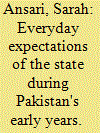

|
|
|
|
|
| Publication |
2011.
|
| Summary/Abstract |
Accessing the day-to-day, albeit pressing, concerns of Pakistanis in the early 1950s can be difficult as a result of the relative paucity of relevant primary material. One set of sources, however, are the letters written to the editors of contemporary newspapers during this period, in which correspondents outlined their expectations of, made demands on, and aired their frustrations with, the everyday state in the years following independence and Pakistan's creation. This paper draws on a sample of this correspondence on the letter pages of Dawn (Karachi) during 1950-1953 in order to explore the views of ordinary citizens as they grappled with problems of housing, transport, food rationing, water shortage, and corruption.
|
|
|
|
|
|
|
|
|
|
|
|
|
|
|
|
| 3 |
ID:
102035
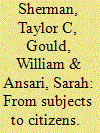

|
|
|
|
|
| Publication |
2011.
|
| Summary/Abstract |
This special issue of Modern Asian Studies explores the shift from colonial rule to independence in India and Pakistan, with the aim of unravelling the explicit meanings and relevance of 'independence' for the new citizens of India and Pakistan during the two decades after 1947. While the study of postcolonial South Asia has blossomed in recent years, this volume addresses a number of imbalances in this dynamic and highly popular field. Firstly, the histories of India and Pakistan after 1947 have come to be conceived separately, with many scholars assuming that the two states developed along divergent paths after independence. Thus, the dominant historical paradigm has been to examine either India or Pakistan in relative isolation from one another. While a handful of very recent books on the partition of the subcontinent have begun to study the two states simultaneously, very few of these new histories reach beyond the immediate concerns of partition. Of course, both countries developed out of much the same set of historical experiences. Viewing the two states in the same frame not only allows the contributors to this issue to explore common themes, it also facilitates an exploration of the powerful continuities between the pre- and post-independence periods.
|
|
|
|
|
|
|
|
|
|
|
|
|
|
|
|
| 4 |
ID:
102040
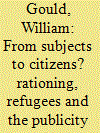

|
|
|
|
|
| Publication |
2011.
|
| Summary/Abstract |
Building on recent work on the 'everyday state' and citizenship in 1947-1948, this paper examines changing practices and representations of 'corruption' in Uttar Pradesh, India over independence. The management and publicity of 'corruption', particularly in the food supply and rationing bureaucracy from the mid-1940s to the 1960s captures changing discussions about public expectations of government and narrates everyday urban experiences of the local state. Representations of administrative corruption within UP government 'anti-corruption' planning, around the late 1930s to early 1940s, reflected changing ideas about the public and citizenship in UP in general-from a colonial stress on administrative authoritarianism, where corruption was presented as a regrettable but unavoidable facet of local power, to a sense of public accountability. By the 1940s, with war-time commodity controls accompanying rapid political change, opportunities for nefarious gain widened, and administrative rules and functions quickly became much more complex. 'Corruption', as a symbolic political weapon, was publicized in a way which now connected national, state and local level discussions of independence, citizenship and state authority. Specifically, the very nature of different types of corruption in the crucial sphere of controls and rationing brought about more developed forms of political protection and backing for the corrupt administrator and encouraged new clientelist networks across the political spectrum.
|
|
|
|
|
|
|
|
|
|
|
|
|
|
|
|
| 5 |
ID:
102044


|
|
|
|
|
| Publication |
2011.
|
| Summary/Abstract |
Whilst the history of the Indian diaspora after independence has been the subject of much scholarly attention, very little is known about non-Indian migrants in India. This paper traces the fate of Arabs, Afghans and other Muslim migrants after the forcible integration of the princely state of Hyderabad into the Indian Union in 1948. Because these non-Indian Muslims were doubly marked as outsiders by virtue of their foreign birth and their religious affiliation, the government of India wished to deport these men and their families. But the attempt to repatriate these people floundered on both political and legal shoals. In the process, many were left legally stateless. Nonetheless, migrants were able to creatively change the way they self-identified both to circumvent immigration controls and to secure greater privileges within India.
|
|
|
|
|
|
|
|
|
|
|
|
|
|
|
|
| 6 |
ID:
102058


|
|
|
|
|
| Publication |
2011.
|
| Summary/Abstract |
Grassroots accounts of the tragic events of partition are increasingly in the spotlight in studies of the transfer of power. This paper approaches the local perspective through the memories of British civil servants during their last few months in Punjab, assessing what these reflections suggest about the mentality of the departing ruling elite. The similarities between these recorded experiences suggest a process of coming to terms with grief and guilt for what they had witnessed through the creation of a narrative of transition from total power to total loss; a simplified imagery of a fully operational and peaceful pre-1947 Punjab descending with shocking suddenness into the violence of partition. This process of shaping memories not only offers an insight into the British civil servant's need for self-affirmation and a reaffirming of their sense of personal as well as professional value, but also has a broader importance in understanding the mentality of a group of people at the heart of pre-partition Punjab, who were instrumental in defining the emerging independent nation.
|
|
|
|
|
|
|
|
|
|
|
|
|
|
|
|
| 7 |
ID:
102042
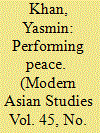

|
|
|
|
|
| Publication |
2011.
|
| Summary/Abstract |
The consolidation of the Nehruvian state's sovereignty after Independence is traced here as a contingent event which was tightly linked to the impact of Gandhi's assassination and the mourning rituals which followed his death in 1948. The Congress was able to use the funeral, mortuary rituals and distribution of Gandhi's ashes to assert the power of the state and to stake the Congress Party's right to sovereignty. This intersected with localized and religious expressions of grief. Gandhi's death therefore acted as a bridge, spatially and temporally linking the distant state with the Indian people and underscoring transitions to Independence during the process of postcolonial transition from 1947-1950.
|
|
|
|
|
|
|
|
|
|
|
|
|
|
|
|
| 8 |
ID:
102037


|
|
|
|
|
| Publication |
2011.
|
| Summary/Abstract |
Studies of the post-colonial state have often presented it as a structure that has fallen under the control of self-interested sections of the Indian elite. In terms of citizenship, the failure of the state to do more to realize the egalitarian promise of the Fundamental Rights, set out in the Constitution of 1950, has often been attributed to interference by these powerful elite. Tracing the interplay between debates about Hindu property rights and popular support or tolerance for the notion of individual, liberal citizenship, this paper argues that the principles espoused in the Fundamental Rights were never neutral abstractions but, long before independence, were firmly embedded in the material world of late-colonial political relations. Thus, in certain key regards, the citizen-subject of the Indian Constitution was not the individual, freed from ascriptive categories of gender or religious identity, but firmly tied to the power structures of the community governed by Hindu law.
|
|
|
|
|
|
|
|
|
|
|
|
|
|
|
|
| 9 |
ID:
102046
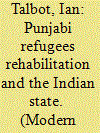

|
|
|
|
|
| Publication |
2011.
|
| Summary/Abstract |
Studies of Punjabi partition-related refugee resettlement have revealed a gap between official accounts and those provided by migrants. The former seek to legitimize the state by narrating its role in the transformation of helpless refugees into productive citizens. First hand accounts on the other hand frequently write the state out of the rehabilitation process. This paper seeks firstly to illustrate these processes at work by contrasting the narrative account contained in the Government of India publication, The Story of Rehabilitation, with interview material collected amongst former refugees. It then goes on to reveal the presence of state agency in cases of rehabilitation, despite refugee denial. Finally, it explores the refugee-state tensions arising from migrants' experience of local level bureaucratic and police services' corruption, which goes some way towards explaining the narrative dissonances.
|
|
|
|
|
|
|
|
|
|
|
|
|
|
|
|
| 10 |
ID:
102050


|
|
|
|
|
| Publication |
2011.
|
| Summary/Abstract |
This paper uses a historical ethnography of the construction of Korangi Township outside Karachi to analyse the configuration of power in the post-colonial Pakistani state of the late 1950s and 1960s. Foucault's distinction between 'sovereign', 'disciplinary' and 'security' power helps to reveal how possibilities of non-interventionist control were deliberately discarded in favour of an (often theatrical) exercise of 'raw' power. The way in which the township was conceived by the international architect and city planner, C. A. Doxiadis, often stood in contrast and tension with the ways in which it was executed by General Ayub Khan's military regime (1958-1968). Rapid early success-tens of thousands of refugee slum dwellers were resettled within six months-went hand-in-hand with equally-quick failure and abandonment later on. The Pakistani regime was only interested in demonstrating its ability to make decisions and to deploy executive power over its territory, but it made no sustained effort to use spatial control to entangle its subjects in a web of 'governmentality'. In the final analysis, the post-colonial Pakistani state was a 'state of exception' made permanent, which deliberately enacted development failure to underscore its overreliance on sovereign power.
|
|
|
|
|
|
|
|
|
|
|
|
|
|
|
|
|
|
|
|
|